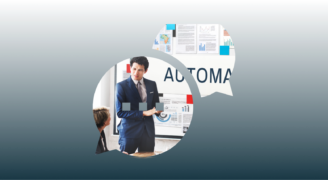Introduction to ERP
In today’s competitive market environment, business progress is rendered by technological advancements. Technology counts the most while driving business into a success. Therefore, Enterprise resource planning is a prerequisite to gain competitive business advantages. ERP software is essential for managing business processes and it allows a business organization to integrate applications, automat, balance, and manage back-office functions concerning technology, services, and human resources.
A Brief History of ERP
The world started undergoing revolutions since its inception. The man was reaching out to build better technologies every day. The history of ERP software applications was traced back to 1960, but the term coined only in 1990 by Gartner. Back then in 1960, the concept was applied to inventory management and manufacturing control.
The primary objective of this system was to monitor inventory, reconcile balances, and reports to know their status and functions. By the end of the 1970s, additions were made with enhanced functionalities such as Material Requirements Planning (MRP) systems, used for scheduling production processes.
The MRP has undergone many transformations during the 1980s. These transformations enhanced the capability of MRP to encompass more manufacturing processes. Later, this version came to know as MRP-II (Manufacturing Resource Planning). By 1990, a tremendous change took over the existing environment and these systems had expanded beyond inventory control. It contributed to working in other back-office functions like accounting and human resources and many more. And Setting up the initial ground for ERP to grow and nurture around.
What Is ERP - Enterprise Resource Planning?
Enterprise resource planning (ERP) is a process of integrating diverse activities of a business in a single platform. The process includes the integration of planning, purchasing, inventory, sales, marketing, finance, human resources, and more. It is an effective management mechanism to integrate fragmented activities into a single base form. ERP software applications are important for the business because they help them implement effective resource planning and management.
In other terms, ERP stands for “Enterprise Resource Planning”. It converges the business processes and activities running into a single software platform. ERP software constitutes diverse applications to automate business functions like production, financial operations, sales, accounting, and many more.
ERP solutions can handle business resources and other associated interlinked activities. ERP can cross channelize the activities happening in all departments and offers better business processes efficiency.
5 Reasons Why You Need an ERP Solution
• Have you ever felt that your business has outgrown your existing software?
• Is your existing process inefficient to capture all aspects of the business?
• Are you struggling with software integrations?
• Are you failing to meet customer demands?
• Is your business lagging behind without a proper technology?
If your answer is yes, let’s read the rest!!!
Basic Components of an ERP System
The following components constitute an ERP system.
1. Accounting
The accounting component of an ERP system mainly deals with the features to capture financial processes. Businesses can benefit from seamless end-to-end business process flows and thereby achieve effective financial management. ERP allows the operations to run in a single source of finance, sales, and customer data flawlessly.
2. Customer Relationship Management (CRM)
Customer relationship management (CRM) helps to manage the relations and interactions with a customer or potential customers. It allows the tools and techniques to stay in line with improved business relationships with customers, streamline those processes, and improved profitability.
3. Manufacturing
The manufacturing industry is a very versatile industry and an ERP solution is essential for optimizing activities that happen on a large-scale production line of machinery and skilled labor.
4. Inventory Management
This provides an integrated approach to manage the inventory and business operations with an effective plan to manage business operations finances, logistics, operations, and inventory in a single platform for availing the best results.
5. Human Resources
Human resource management (HRM) is a very important yet inevitable part of businesses. ERP helps to unify the activities in all the departments of an organization into a single integrated software program. All the departments use a single database to share and communicate information
6. Analytics and Reporting
ERP provides essential tools for business intelligence and generating reports to analyze business performance. With this tool, businesses can mark and gain insights on sales volumes, customer retention, products and services growth, customer profitability, best business decisions, and so on
Types of ERP by Industry
There are several types of ERP software available in the open market to serve diverse functions and specific needs of the industry. It is because the general ERP systems sometimes unable to deliver necessary features to perform well in a system. There are industry-specific solutions that need to be addressed which can be dealt with industry-specific ERP solutions. A powerful ERP can make your business move forward and to attain future growth and development.
Apparel ERP: This ERP is specially designed for suiting the expectations of apparel, clothing, and fashion industry and their specific needs and requirements.
Automotive ERP: Automotive ERP deals with the manufacturing and warehousing market. It deals effectively with the functions of inventory management, scheduling, quality control, refund, and return policies, and many others.
Construction ERP: Construction and maintenance industry is a huge phased business entity. It deals with labor, equipment, materials, subcontractors hired, and many other fragmented parts. The construction ERP designed to align the functions of construction task management, work loading, scheduling, and so on.
Education ERP: This ERP was a useful solution to extend efficient support to colleges and universities. And it is highly efficient in managing activities ranging from tuition billing, admissions, exam grading, and many more.
Types of ERP with Respect to Implementation
Following are the different types of operational ERP software solutions available in the market:
On-premise ERP: On-premise ERP software is created for activities involved within and across the businesses regardless of the size and nature of the business operation. It is usually deployed on to the in-site devices to achieve competitive advantages for the business.
Open Source ERP: Open-source software ERP solution is an easily customizable application. This application can be tailored to suit your workplace structure. There are different functions by inspecting, modifying, and enhancing ERP source code.
Cloud-based ERP: Cloud ERP provides any ERP Software-as-a-Service (SaaS) available over a Cloud-hosting service instead of an on-premise deployment. This offers real-time data access via the Internet and it is perfectly suiting the large enterprises.
Hybrid ERP: Hybrid ERP is a combination of on-premise and Cloud-based deployment.
Cloud-based ERP software is an ideal solution. Cloud ERP seemed to be quite useful for the company running a business with multiple locations that need to be connected with each other. Cloud-based ERP delivers the highest risk management and greater data security. In this regard, NetSuite ERP is a powerful loud ERP solution that you can earn to trust on. NetSuite ERP has the best ways and features to make a more powerful business transition into success. NetSuite is highly customizable and flexible render services on CRM, eCommerce, and PSA.
Benefits and Business Value of ERP
To be precise, the following are the values and benefits owned by ERP.
• Focused IT Costs
• Total Visibility
• Improved Reporting and Planning
• Flexible Modularity
• Improved Efficiency
• Customer Service
• Data Security and Quality
• Improved Collaboration and Workflows
• Standardized Business Processes
• Improved Supply Chain Management
• Superior Scalability
Benefits of ERP
Enterprise resource management provides better business performance with these great benefits:
1. Workflow Visibility and Streamlining
ERP systems can provide workflow visibility and operational streamlining. With ERP systems companies can coordinate activities running across multiple locations within a single platform. It converges fragmented activities to get real-time details about the activities running simultaneously at different centers.
2. Business Intelligence and Data Analytics
Intelligent business decisions are the result of accurate and reliable data. ERP solutions has efficient tools for data collection, analytics, and reporting methods, and these are together termed as Business Intelligence (BI) tools. It opens a window for data analysis within real-time data. This provides instant changes to your production processes. The business forecasting can be done through historical data. With ERP applications allows the efficient generation of customized reports, this can be provided to the shareholders, business partners, or else business partners and other association teams to make them informed about the business status and also to make progressive decisions.
3. Options for Scheduling Solutions
ERP Solutions complies with efficient scheduling tools. And these tools are highly customizable. Companies can coordinate activities pertaining to different schedules. They can also confine actions on to a single calendar. For instance, by scheduling all the actions across various departments and supply chain partners they can remain on the same operational schedule even within a single platform.
4. Cross-Department Collaboration
The best practice is to ensure efficiency to make effective collaboration between multiple departments. This will help to avoid mistakes and can stay in contact across different time zones and multiple languages. ERP communication tools organize the process efficiently by tracking and recording documentation, files, emails, texts, and phone call recordings, etc-. There are even private, internal channels for instant communication mechanisms that are available to collaborate with distributed business.
5. Efficient Risk Management and High Data Security
Netsuite helps to protect your company from fraudulent practices with highly efficient security measures. If Your company handles a lot of sensitive data, you are entitled to protect them from malware. Within confining to highest data security measures of NetSuite ERP companies can keep all important documentation and communication in a single platform without any data duplication or redundancies.
6. Customizable Solutions
ERP offers customizable solutions to fetch the unique and dynamic business requirements. Updated technologies change the capabilities of ERP applications every day so as your business. The latest trends in ERP include artificial intelligence computing and the Internet of Things (IoT) solutions.
How to Select an ERP System?
Selecting an ERP system is very crucial. You need to keep some important key points in your mind.
1. Conduct a pre-process review and analysis
Before choosing the best ERP solution for your business, it is important to have background research on understanding the capabilities and functions of each ERP solution. This research yields the best results in selecting a better ERP.
2. Evaluate the technical features
The perfect solution can mark the best technical feasibility and functional enhancements. So before choosing an ERP for your business, it is mandatory to evaluate and analyze the technical efficiency of the business requirements.
3. Understand the cost of purchase
For rendering an ERP solution for your business, you must have the best investment plan. Your investment is worth yielding the best impacts on your business. You may choose the best ERP concerning your investment and budget.
4. Implementation plan
The best part of accomplishing your business success is the implementation plan that you value. If you have the best ERP implementation plan and implementation partners you're standing a mere step ahead to your success.
5. Track the potential business benefits of the ERP system
Track the potential benefits of ERP software applications with the benefits achieved via business success. To track the potential benefits of an ERP concerning the chance of winning your business.
6. Expand your choices of ERP solution
You need not be confined to options while selecting an ERP, expand your horizons, reach out to the best service providers and ERP applications, and choose the best which caters to your business needs.
7. Get unbiased and objective advice
Get expert advice before making a decision. Unbiased and objective advice can help you to get the best solution for your business.
How ERP Helps?
In general, NetSuite helps enterprises with the following benefits.
• To integrate functions and operations seamlessly in a single, central workspace.
• To eliminate data redundancies.
• To get a centralized operational space.
• To store and secure excessive amounts of data for running business operations.
• To ensure the flexibility of business operations.
• To attain growth and business continuity.
Netsuite ERP: Why It Stays Exceptional?
NetSuite is a highly flexible platform and delivers an end to end business solution. It is also a highly flexible business solution to strengthen up the enterprises. NetSuite focuses on providing optimized business processes, functional aspects, and other business actions in a cloud-deployed platform. NetSuite helps the businesses to adapt to the changes very quickly and efficiently. It is highly responsive to dynamic business demands.
With the help of Netsuite, businesses can achieve cross channel business through multiple locations, currencies, and languages. NetSuite helps in integrating and expanding business easily across the borders. Along with ERP benefits, NetSuite offers CRM tools, eCommerce capabilities, and PSA in a single suite of packages.
NetSuite offers underlined benefits to businesses
The business will receive underlined benefits to flourish better in its business arenas with the following benefits.
Process Efficiency: NetSuite ERP can optimize various business processes. It ensures the smooth processing of business by automation of various processes and thereby the process efficiency of a business could be improved.
Unification: Optimization and unification of fragmented activities through a single window of operation is another important benefit that you can gain from NetSuite ERP. Unification of different processes can get better results and business advantages. Businesses can get rid of data redundancies and thus saves time.
Extensive Communication: NetSuite has the advantage of making the business communications the way stronger with clear and unambiguous delivery of messages and automated communication and so on.
Improved Data And Real-Time Data Visibility: With NetSuite ERP, Businesses can achieve improved data visibility. Businesses can equip themselves with tools and techniques to tackle the issues even before they occur.
Universal Accessibility: NetSuite ERP operates on a cloud system. Businesses can access the data anywhere in the world through the internet. So businesses can operate on this platform without any worries about data loss. Universal accessibility can eliminate the challenges of geographical boundaries and time zone while operating the business.
Key Benefits of Netsuite ERP
NetSuite can enhance the business processes with its exceptional features and the business will receive the following key benefits.
• Accelerated growth
• User-driven innovation.
• Customization
• Robust
• Flexibility
• Scalability
We Are Ready to Serve You
Jobin & Jismi serve a spectrum of NetSuite services. From consulting, development, implementation and customizations, integrations, and allied others. We focus on building powerful business enterprises with NetSuite ERP. We deliver services with exceptional quality and high expertise. We help you to maximize your investment in the NetSuite system. You can avail of our services by dropping a message to contactus@jobinandjismi.com



